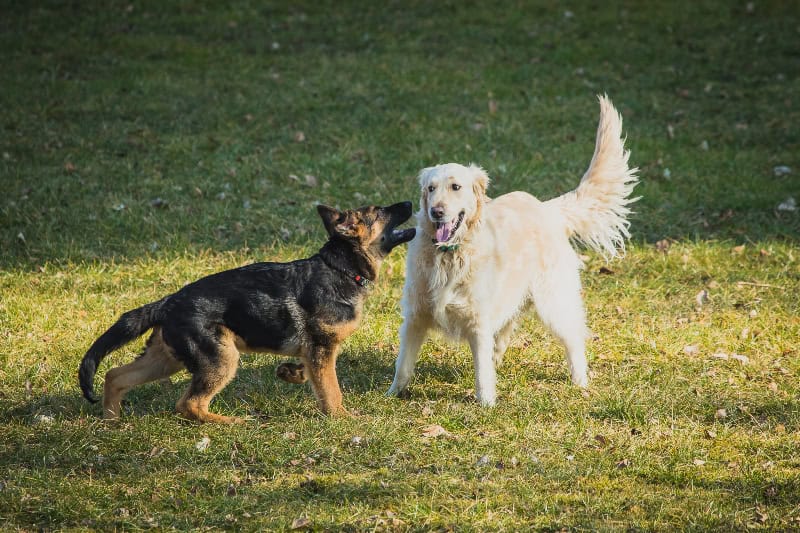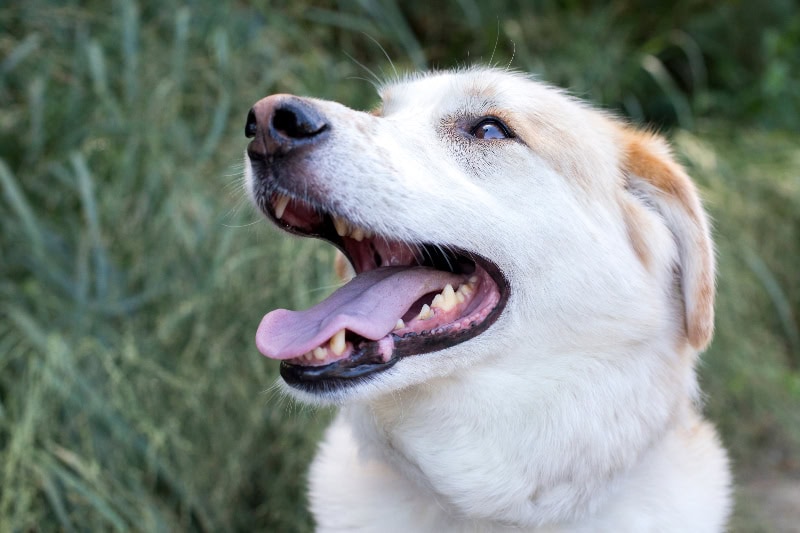Have you ever wondered what happens when you mix the intelligence and loyalty of a German Shepherd with the friendly, easy-going nature of a Golden Retriever? That’s how you get the amazing Golden Shepherd. This mixed-breed dog, also known as the German Retriever, Golden German Shepherd, and German Shepherd Golden Retriever, brings together the best of both worlds.
Are you curious about how big these dogs get or what their coat looks like? Wondering if they make good family pets or how they handle being left alone? Stick around, and we’ll dive into all these details and more about what makes the Golden Shepherd a special breed.
TABLE OF CONTENTS
- Golden Shepherd Quick Summary
- German Golden Retriever Parent Breeds
- Physical Characteristics of a Golden Shepherd
- German Shepherd Golden Retriever Mix Personality and Temperament
- Golden Shepherd Care Guide
- Golden Retriever German Shepherd Mix Health Issues
- German Shepherd Golden Retriever Mix Price
- Should You Get a German Shepherd Golden Retriever Mix?
- FAQs about the German Shepherd and Golden Retriever Mix
- An Affectionate, Intelligent & Energetic Companion
- Other German Shepherd and Golden Retriever Mixes
Golden Shepherd Quick Summary
German Golden Retriever Parent Breeds
The Golden Shepherd is a relatively new designer breed, and there’s still much to learn about its history. Understanding the parent breeds can help us better understand the Golden Shepherd’s traits and temperament. Please stick with me as we explore what each parent breed brings, giving you a deeper insight into this fascinating mix.
German Shepherd
Origin
The German Shepherd has its roots in 19th-century Germany. I’ve learned these dogs were originally bred for herding flocks and guarding livestock. Their selective breeding focused on creating a dog that was strong, intelligent, courageous, agile, and work-driven. These attributes quickly made the German Shepherd one of the most popular working breeds of its time. The first dog to be officially recognized as a German Shepherd was Horand von Grafrath, back in 1899.
Physical Characteristics
When I think of a German Shepherd, I picture their distinct black and tan coats and muscular builds. They’re not just built for strength; they’re agile and quick, which makes them excellent working dogs. It’s fascinating how Golden Shepherds that take after their German Shepherd parent often inherit these striking physical traits.
Temperament and Behavior
German Shepherds are known for their intelligence and work ethic. They’re incredibly obedient and can be trained to perform a wide variety of tasks. From what I’ve seen and read, these dogs are not only strong and courageous but also very loyal and protective, making them excellent guard dogs. Their temperament is a big part of what makes them such a valued breed for both work and companionship.
Golden Retriever
Origin
The Golden Retriever has quite an interesting history. It was originally bred in the 19th century to help fishermen and hunters retrieve waterfowl from cold waters. This breed was developed with a soft bite to avoid damaging the birds while bringing them back. What I find fascinating is that the Golden Retriever was selectively bred from several other breeds, including Bloodhounds, Spaniels, and Setters, specifically for its retrieving instincts and gentle nature. The American Kennel Club (AKC) recognized the breed in 1925.
Physical Characteristics
When you picture a Golden Retriever, you probably think of their beautiful golden coats. They have moderate feathering, which gives them that signature look. Golden Shepherds that take after their Golden Retriever parent often have this same golden coat. Their build is typically more on the lean and muscular side, which makes them great for physical activities and, of course, retrieving.
Temperament and Behavior
Golden Retrievers are known for their outgoing and sociable nature. From what I’ve noticed, they’re incredibly friendly and get along well with just about everyone, including children and other animals. This breed’s gentle temperament is one of the reasons they’re such popular family pets. Golden Shepherds that inherit this temperament from their Golden Retriever parent are often just as friendly and easy-going. They’re the type of dogs that bring a lot of joy and warmth into a home.
Physical Characteristics of a Golden Shepherd
When it comes to the Golden Shepherd, their physical characteristics are a fascinating blend of both parent breeds. Let’s dive into what makes these dogs stand out.
Size
From what I’ve seen, Golden Shepherds are definitely on the larger side. They can grow up to 26 inches tall and weigh under 90 pounds. Males usually stand between 23 and 26 inches tall and weigh between 65 and 90 pounds, while females are a bit smaller, standing 21.5 to 24 inches tall and weighing between 50 and 70 pounds. Interestingly, at just eight weeks old, these pups can be anywhere from 4 to 8 inches at the shoulder. They typically reach their full adult size within two years, although their weight can vary depending on diet, activity level, and overall health.
Color
One of the things I find most captivating about Golden Shepherds is their wide range of coat colors. They can come in almost any hue you can imagine, including sable, blue, white, brown, tan, black, gray, silver, cream, light golden, dark golden, and golden. This variety makes each Golden Shepherd unique, often leaving you curious about what color their coat will turn out to be as they grow.
Coat
Golden Shepherds have a medium-length double coat that’s both functional and beautiful. The undercoat is thick and plush, providing excellent protection against extreme temperatures. The outer coat is dense and coarse, sometimes with a wavy texture. Most of these dogs have feathering on their chests, legs, undersides, and tails, which adds to their striking appearance. I’ve noticed that the combination of the undercoat and outer coat not only looks great but also offers practical benefits for their diverse living environments.
German Shepherd Golden Retriever Mix Personality and Temperament
From Adobe Stock
Golden shepherds inherit a combination of personality traits from their parent breeds. Based on the AKC’s temperament guide, German shepherds are fearless, confident, and alert, and golden retrievers are reliable, friendly, and trustworthy.
In my experience, most German Shepherd Golden Retrievers make wonderful family companions. They’re affectionate and loyal, and they get along well with children. They’re also quite easy to train and can learn complex tasks quickly. It’s incredible how these dogs can combine the best qualities of both parent breeds.
I’ve noticed that Golden Shepherds are typically outgoing, though some can be a bit reserved or even aloof around strangers, especially if they haven’t been socialized from an early age. These dogs crave plenty of affection, attention, and mental stimulation throughout the day. If left alone for long periods, they can become anxious and may exhibit unwanted behaviors.
Although Golden Shepherds are rarely aggressive, they do tend to be mouthy and love to chew on things. Providing them with plenty of durable chew toys and starting bite inhibition training while they’re young can help manage this behavior. It’s all about understanding their needs and keeping them engaged and happy.
Golden Shepherd Care Guide
Golden Shepherds are generally easy to care for. They’re highly trainable and don’t tend to be fussy about their food. However, their boundless energy means they need plenty of exercise and mental stimulation to stay happy and healthy.
I find that regular vet checkups and a nutritious diet are key to helping German Shepherd Golden Retriever mixes live long, healthy lives. Let’s dive into the specifics of how to best care for these wonderful dogs.
Feeding
Feeding a Golden Shepherd can be a bit of an art form, but with the right approach, it’s straightforward. From what I’ve observed, these dogs thrive on a well-structured feeding routine. Here are some guidelines and tips to help you get it just right.
Portion Size and Frequency
Golden Shepherds should be fed between 2 and 3.5 cups of dog food per day, divided into two meals. The exact portion size depends on several factors, including the dog’s age, health, activity level, metabolism, and build. For instance, a more active dog might require closer to 3.5 cups, while a less active one might need only 2 cups.
Type of Food
It’s essential to choose kibble that is specially formulated for large-breed dogs and contains at least 18% protein. This ensures they get the necessary nutrients to support their muscle mass and overall health. Look for high-quality dog food with real meat as the first ingredient, and avoid foods with fillers like corn and soy.
Avoid Free-feeding
One key tip is to avoid free-feeding Golden Shepherds. These dogs tend to have insatiable appetites and can put on weight quickly if left to their own devices. Stick to a regular feeding schedule and monitor their weight to make any necessary adjustments.
Treats
When it comes to treats, moderation is crucial. Treats shouldn’t make up more than 10% of your dog’s daily calorie intake. Opt for healthy treats and use them primarily as rewards during training. This not only helps maintain their weight but also reinforces good behavior.
Grooming
Grooming a Golden Shepherd is a vital part of keeping them healthy and looking their best. From what I’ve noticed, these dogs have specific grooming needs due to their unique coats. Let’s break down some grooming tips and guidelines to help you keep your Golden Shepherd in top condition.
Brushing
Golden Shepherds shed moderately throughout the year, with heavier shedding periods in spring and fall. It’s important to brush them twice a week to keep their coats healthy and free from mats. During those heavy shedding seasons, daily brushing is recommended to manage the excess fur and reduce shedding around the house. While brushing, take the opportunity to check their skin and ears for any signs of ticks, wounds, or infections.
Bathing
Bathing is another key aspect of grooming. Golden Shepherds typically need a bath every few months, but if they get particularly dirty or muddy, you might need to bathe them more frequently. Use a gentle, dog-specific shampoo to avoid irritating their skin. After the bath, make sure to dry them thoroughly, especially if they have a thicker coat, to prevent any moisture-related skin issues.
Nail Clipping
Keeping your Golden Shepherd’s nails trimmed is essential for their comfort and health. Overgrown nails can cause discomfort and even lead to issues with their gait. Check their nails regularly and clip them as needed, usually every few weeks. If you’re not comfortable doing this yourself, a professional groomer or your vet can help.
Ear and Dental Care
While grooming, don’t forget about ear and dental care. Regularly check their ears for signs of infection or buildup and clean them with a vet-approved solution. Additionally, brushing their teeth several times a week helps prevent dental issues and keeps their breath fresh.
Training and Exercise
From Adobe Stock
Training a Golden Shepherd can be a rewarding experience, especially if you approach it with the right techniques and mindset. From my observations and what I’ve learned, these dogs thrive on structure and positive reinforcement. Let’s dive into some training tips and guidelines to help you get the best results with your Golden Shepherd.
Training
Golden Shepherds are easy to train due to their work-driven nature, intelligence, and eagerness to please. Starting training as early as eight weeks old is ideal. Begin with name training, housebreaking, and basic obedience commands like “sit,” “stay,” “come,” and “lie down.” Keep training sessions brief because Golden Shepherd puppies have short attention spans. I’ve noticed that positive reinforcement methods, such as rewarding desired behavior with treats or praise, yield the best results. Avoid using punishments, as they can lead to stress, fearfulness, or aggression in your dog.
Exercise
Golden Shepherds are active, working dogs that need plenty of exercise to stay happy and healthy. They require at least two hours of exercise per day, ideally split into two to three separate walks. Engaging in activities like agility training, running, hiking, herding, and swimming can be particularly beneficial. From what I’ve seen, it’s important to avoid overexercising Golden Shepherd puppies to prevent straining their developing bodies. These dogs do best in households with spacious backyards, but they can adapt to apartment living if they receive daily exercise and lots of attention.
Socialization
Socialization is crucial for Golden Shepherds and should begin during puppyhood. Expose your dog to new sights, places, and people in a positive manner. Introducing your Golden Shepherd puppy to other animals and various textures, noises, and smells will help them become well-rounded adults. Proper socialization can prevent behavioral issues and ensure your dog is comfortable in different environments.
Mental Needs
German Shepherd Golden Retriever mixes are intelligent, work-driven dogs that need at least an hour of mental stimulation per day. Suitable activities include learning new tricks, practicing scent work, playing fetch, and engaging in problem-solving games. I’ve found that keeping their minds busy is just as important as physical exercise to prevent boredom and unwanted behaviors.
Golden Retriever German Shepherd Mix Health Issues
Golden Shepherds, like all breeds, have their share of health issues. While they generally have an average life expectancy of 7 to 12 years, there are several common health problems to be aware of. Here are some insights into these issues and what to look out for.
Hip Dysplasia
Hip dysplasia is an inherited condition caused by the improper development of the hip joint. From what I’ve observed, dogs with hip dysplasia may exhibit symptoms such as mobility issues, lethargy, pain, and an abnormal gait. This condition can be managed with lifestyle changes, medication, and, in severe cases, surgery. Regular vet checkups and maintaining a healthy weight can help manage and potentially alleviate some of the discomfort associated with hip dysplasia.
Epilepsy
Epilepsy is a chronic disorder that affects the brain and causes seizures. Symptoms to watch for include jerking behavior, muscle twitching, drooling, excessive panting, and urination. I’ve noticed that treatment for epilepsy often involves lifelong medication, stress reduction, and the elimination of potential triggers. It’s crucial to work closely with a vet to manage this condition effectively.
Bloat
Bloat is a life-threatening condition that occurs when the stomach fills up with gas, liquid, or food, causing it to extend and twist. Symptoms include a swollen belly, excessive drooling, lethargy, retching, and pain. This condition requires urgent veterinary care. From what I’ve learned, preventing bloat involves feeding smaller, more frequent meals and avoiding vigorous exercise immediately after eating.
Cataracts
Cataracts cause the eye lens to become cloudy, leading to vision issues. While cataracts can sometimes be managed with medication, surgery is often necessary to remove them and restore vision. Regular eye checkups can help catch this condition early.
Osteosarcoma
Osteosarcoma is a form of malignant bone cancer. Symptoms include a noticeable lump, appetite loss, mobility issues, pain, a rapid heartbeat, and increased thirst. Treatment usually involves chemotherapy and surgery. I’ve found that early detection and treatment are crucial for improving the dog’s quality of life.
Hemangiosarcoma
Hemangiosarcoma is a malignant cancer that affects the liver and spleen. Symptoms include weight loss, weakness, seizures, loss of movement, a rapid heartbeat, and dementia. Treatment options often include chemotherapy, intravenous fluids, blood transfusions, surgery, and palliative care. Regular vet visits can help detect this cancer early, which is vital for managing the condition.
German Shepherd Golden Retriever Mix Price
I’ve noticed that they are relatively affordable compared to purebred dogs. If you’re considering bringing one into your home, here are some insights on what you can expect to spend.
How Much is a Golden Retriever German Shepherd Mix?
A Golden Shepherd mix typically costs between $250 and $1,000. The most expensive ones are puppies with prized lineage, especially those from reputable breeders. I recommend choosing a breeder who provides health certificates and clearances for the parent breeds and allows you to see the puppy interact with its mother. Be cautious of puppies sold before they’re eight weeks old or those that are extremely cheap, as these can be red flags for potential health or behavioral issues.
Adopting an adult Golden Shepherd from a rescue shelter can be a more budget-friendly option, costing between $50 and $300. Many rescue shelters also cover the initial costs of neutering or spaying and vaccinations, which can save you money in the long run.
How Much Does it Cost to Raise a German Shepherd Golden Retriever Mix?
Raising a Golden Shepherd involves ongoing expenses. Expect to pay between $1,200 and $2,400 per year, or about $100 to $200 every month. This includes costs for food, health checkups, grooming supplies, and toys. The first year of ownership tends to be more expensive due to additional needs like bedding, a crate, vaccinations, and neutering or spaying.
From what I’ve observed, training classes, professional grooming, and pet sitters can significantly increase the cost of care. Health issues can also lead to higher expenses, especially as your dog ages. Senior dogs often require mobility aids, more frequent vet checkups, and medications to support their joints.
Should You Get a German Shepherd Golden Retriever Mix?
The Golden Shepherd makes an excellent family companion because of its playful, affectionate, and intelligent nature. However, before deciding to buy or adopt one, it’s important to ensure you can meet this breed’s needs. Here’s what I’ve learned about who should consider getting a Golden Shepherd.
Golden Shepherds Are Suitable for:
Golden Shepherds are a great fit for families that don’t work long hours and have plenty of time to bond with their pets. In my experience, the best owners for Golden Shepherds are active individuals who have access to a backyard and are prepared to walk, play, groom, and train their dogs daily. These dogs thrive on interaction and exercise, so having the time and energy to engage with them is crucial.
I’ve noticed that Golden Shepherds can also do well in households with other animals, provided they are socialized from a young age and introduced to other pets gradually. This socialization helps them develop good behaviors and become comfortable around different animals.
Golden Shepherds Are NOT Suitable for:
On the flip side, Golden Shepherds are not ideal for inactive people, people with mobility issues, or those who cannot commit to walking a dog for at least two hours per day. If you work long shifts or are frequently away from home, this breed might not be the best choice because Golden Shepherds are prone to separation anxiety. They need companionship and can become anxious and destructive if left alone for long periods.
Additionally, Golden Shepherds are quite messy and shed a lot. They might not be suitable for people who suffer from allergies or those who prefer a spotless home. Families looking for a low-maintenance, laid-back dog should probably consider other breeds, as Golden Shepherds require regular grooming and plenty of attention.
FAQs about the German Shepherd and Golden Retriever Mix
What is the average lifespan of a Golden Retriever German Shepherd mix?
The average lifespan of a Golden Retriever German Shepherd mix is typically between 7 to 12 years. This mixed breed tends to be relatively healthy but can be prone to certain health issues such as hip dysplasia, epilepsy, and various cancers. Regular vet checkups and a nutritious diet can help maximize their lifespan.
How much exercise does a German Golden Retriever need?
A German Golden Retriever requires at least two hours of exercise per day. This can be divided into multiple walks, play sessions, or activities like hiking, running, and agility training. It’s important to provide a mix of physical and mental stimulation to keep them happy and healthy.
Are Golden Retriever German Shepherd mixes good with children?
Yes, Golden Retriever German Shepherd mixes are generally good with children. They are known for being affectionate, loyal, and protective, making them great family pets. Early socialization and training can help ensure they interact well with kids and other pets.
What type of coat does a German Golden Retriever have?
A German Golden Retriever typically has a medium-length double coat. The undercoat is thick and plush, while the outer coat is dense and sometimes wavy. Their coat can come in various colors, including sable, blue, white, brown, tan, black, gray, silver, cream, light golden, dark golden, and golden.
How much does a Golden Retriever German Shepherd mix cost?
The cost of a Golden Retriever German Shepherd mix can range from $250 to $1,000. Puppies from reputable breeders with prized lineage are usually more expensive. Adopting a German Golden Retriever from a rescue shelter can cost between $50 and $300, and often includes initial vaccinations and neutering or spaying.
What are common health issues in a German Golden Retriever?
Common health issues in a German Golden Retriever include hip dysplasia, epilepsy, bloat, cataracts, osteosarcoma, and hemangiosarcoma. Regular veterinary care and a healthy lifestyle can help manage and prevent some of these conditions.
How often should I groom my Golden Retriever German Shepherd Mix?
You should groom your Golden Retriever German Shepherd mix at least twice a week. During periods of heavy shedding in spring and fall, daily brushing is recommended. Regular grooming helps keep their coat healthy and reduces shedding around the house.
Are German Golden Retrievers easy to train?
Yes, German Golden Retrievers are generally easy to train due to their intelligence and eagerness to please. They respond well to positive reinforcement techniques. Early training, including basic obedience and socialization, is crucial for developing good behavior.
An Affectionate, Intelligent & Energetic Companion
When I think about the Golden Shepherd, three words come to mind: affectionate, intelligent, and energetic. This breed is a wonderful blend of the best qualities of both the German Shepherd and Golden Retriever. These dogs are incredibly loving and loyal, making them excellent companions for families. Their intelligence shines through in how quickly they pick up on training and their eagerness to please.
However, owning a Golden Shepherd does come with responsibilities. These dogs have boundless energy and need plenty of exercise every day. I’ve noticed that they thrive in environments where they have lots of space to run and play. They’re also quite social and need regular interaction with their family to stay happy and healthy.
Grooming is another important aspect of caring for a Golden Shepherd. Their thick double coat requires regular brushing to keep it healthy and reduce shedding, especially during the heavy shedding seasons in spring and fall. Regular grooming sessions also provide a great opportunity to check for any signs of health issues.
In terms of who should get a Golden Shepherd, I’d say they’re perfect for active individuals or families who can dedicate time to their exercise and mental stimulation needs.
Other German Shepherd and Golden Retriever Mixes
If you’re interested in learning about other German Shepherd mixes or Golden Retriever mixes, check out the hybrid dog breeds below.
German Shepherd Mixes
- German Shepherd Husky Mix
- German Shepherd Pitbull Mix
- German Shepherd Border Collie Mix
- German Shepherd Rottweiler Mix
- German Shepherd Wolf Mix
- Shepadoodle
- Miniature German Shepherd
- Shiloh Shepherd
- German Shepherd Chow Mix
- German Shepherd Corgi Mix
- German Shepherd Beagle Mix
- Akita German Shepherd Mix







I love your informative dog articles. While I can appreciate your article on German Shepherd – Retriever mix, I am a small dog owner. I have a Westipoo and would love more information on this mix. He is a wonderful companion for me.
Hi Sue – if you love small dogs, you will love our articles on the Shorkie and Morkie!
Hi there I have owned now to golden retriever and German shepherd mixes. They have both been incredibly intelligent, do not steal food, know their limits, incredibly protective and loyal and good companions for children. Both of my dogs have been left home alone all day while I work and do not experience any sort of separation anxiety. My first was a brown and tan Shepherd mix and my second was a white Shepherd and golden retriever mix. Both dogs exceptional and I will always look for this mix when looking for a dog.
I guess having two dogs helps keep them happy while you are gone?
Hi Ern, this is a common myth. Many owners think if they have one dog they need to leave alone, getting them a friend will keep them company.
A happy dog is a happy dog, whether or not they have a friend. It’s equally true for an unhappy dog.
If a dog is suffering with true separation anxiety, that needs to be addressed. Often, well meaning owners find their suffering dog a friend and it just results in two dogs suffering with separation anxiety.
There are plenty of owners who added a second dog to their home and noticed a difference with their original dog, but we’d hazard a guess the first dog wasn’t suffering with true separation anxiety.
So, there’s no reason why you shouldn’t have more than one dog, but it’s a myth that a second dog will fix any potential behavioural issues with the first. That’s the job of the owner.
I have 1 year old Golden Shepherd (just turned 1) . She is 84 lbs and slim. She has long shiny black fur and floppy ears. She sheds like crazy. She has the sweetest personality. Loves everyone she meets (canine and human). Barks when someone comes to the door which I like. No issues with separation anxiety. She is perhaps the most chill young dog I’ve ever been around.
I have been looking for a Golden Shepherd for a long time. Would you mind telling me where you got her? I can’t find any available 🙁
Where are you located? We have german shepherd mix pups and we believe the father is our golden retriever. They are almost five weeks old.
Do you have pictures of the pups, we are looking into adopting another member to our family.
I am going to adopt a Golden retriever and German Shepherd mix. He is black. I met him almost 5 hours ago and tomorrow morning I will bring him home.
Just adopted a 10 week old golden shepherd. She’s such a sweet ornery little baby. Loves playing with my 3 year old lab/boxer/pit mix. So happy to have her in our family.